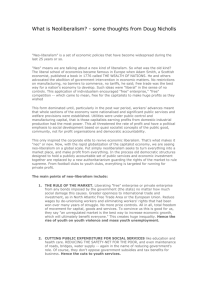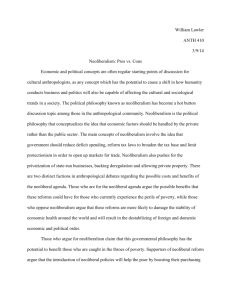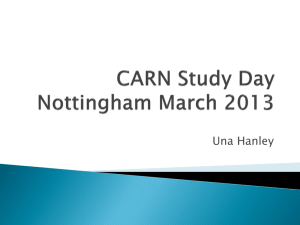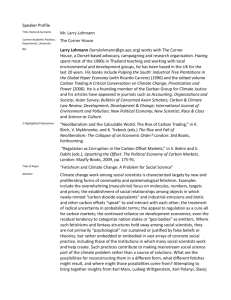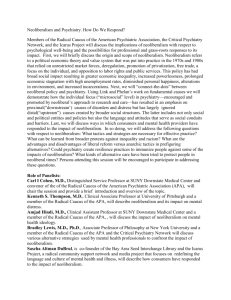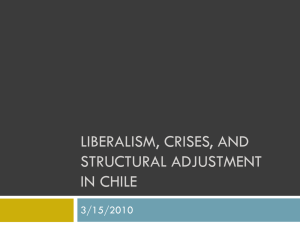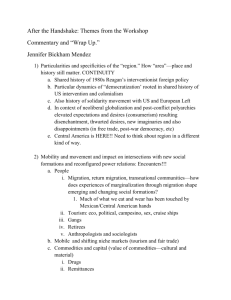invisible hand talk
advertisement
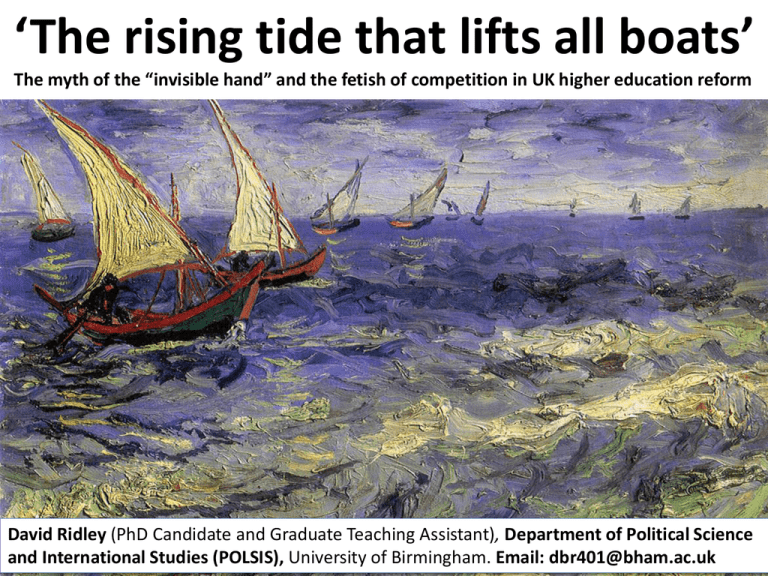
‘The rising tide that lifts all boats’ The myth of the “invisible hand” and the fetish of competition in UK higher education reform David Ridley (PhD Candidate and Graduate Teaching Assistant), Department of Political Science and International Studies (POLSIS), University of Birmingham. Email: dbr401@bham.ac.uk I have worked on many different areas of the public sector over the past 30 years. The biggest lesson I have learned is that the most powerful driver of reform is to let new providers into the system. They do things differently in ways that none can predict. They drive reform across the sector… It’s the rising tide that lifts all boats. Currently, one of the main barriers to alternative providers is the teaching grant we pay to publiclyfunded HEIs [higher education institutions]. This enables HEIs to charge fees at a level that private providers could not match, and so gives publiclyfunded HEIs a significant advantage. Our funding reforms will remove this barrier, because all HEIs will – in future – receive most of their income from students via fees. This reform, of itself, opens up the system. David Willetts, in a speech to the vice-chancellors of England’s universities in Febuary 2011 But… Why do we need reform? Why ‘open up the system’? This presentation will argue that the reforms are driven by an irrational belief in the myth of the invisible hand (which is a symptom of neoliberalism) Why reform UK Higher Education? A Brief History • 1997 Dearing Report: crucial text – ‘Free tuition is unaffordable in the mass system of higher education which we now have.’ (Barr & Crawford 1998) – Student numbers rose from 5 per cent in the early 1960s to a mass 30 per cent by the mid 1990s • Three economic problems with HE in 1997 addressed by Dearing Report: 1. Universities were poor 2. Students were poor 3. Top-up loans were mortgage style rather than incomecontingent (IC loans) • Main reason for not switching to IC loans was that they were classified as public expenditure (a problem now solved!) Tuition Fees begin with Labour (not the Tories!) • New Labour – 1998, following Dearing’s recommendations, introduced £1000 tuition fees – In their second term of government, increased tuition fees to £3000 • Ironically – Labour had promised not to increase tuition fees in 2001 election manifesto – Conservatives were opposed to tuition fee increases - Iain Duncan Smith said fees were a ‘tax on learning’ – Even Queen stated in her 2003 speech that ‘up-front tuition fees would be abolished for all full-time students’. The Browne Review • One of the concessions made to opposition to Labour’s reforms in Parliament was a full review • Lord Browne, then Chairman of British Petroleum, recommended the following reforms (and others): – – – – – Removal of tuition fee cap No cap on student numbers Loan repayment threshold raised to £21000 Scope for removal of funding for non-priority subjects Super-quango to be created for regulation of HE The quality of teaching and of the awarded degrees is the foundation upon which the reputation and value of our higher education system rests. Our recommendations in this area are based on giving students the ability to make an informed choice of where and what to study. Competition generally raises quality. The interests of students will be protected by minimum levels of quality enforced through regulation. Lord Browne (2010: 2) Securing a Sustainable future for Higher Education The Coalition and Austerity • Tory-Liberal Coalition government – Browne Review pick ‘n’ mix – Concessions to Liberals (interest linked to inflation) • Austerity agenda – The 2011 White Paper: ‘We were given the [Browne] report in an environment when public funding had to be reduced and we accepted the main thrust – that the beneficiaries of higher education would need to make a larger contribution towards its costs’ So, how successful have the reforms been so far? Not very! They have arguably been a complete failure! Have we reduced public spending on HE? (Ridley 2014) • Coalition “gamble”? That even after an estimated 30% of loans written off (after 30 years), government would still save £1billion • However, recent estimations have revised this figure to 45%, ‘all but nullifying any savings to the public purse’ • London Economics have predicted that if the write-off exceeds 48.6% then the cost of the reforms will exceed the cost of the system it replaced. Will market reforms increase quality? (Ridley 2014) • National Audit Office published report (2nd Dec 2014) that shows 20% drop out rate for “alternative” (i.e. for-profit) HEIs in 2012-2013 • Drop-out rate at HEFCE funded (public) HEIs: 4% • In 2012 Senator Tom Harkin published in-depth (2 year project) report on 30 US for-profit HEIs and found • 64% average drop-out rate • relatively little amount of money spent on instruction – 22.4% on marketing and advertising, 19.4% on profit distributions and only 17.7% on instruction. SO WHY CARRY ON? Neo-liberalism • Critics of market reforms often invoke the concept of “neo-liberalism” • Example: for Henry Giroux (2009) Neoliberalism: – assaults all things public – mystifies the basic contradiction between democratic values and market fundamentalism – weakens any viable notion of political agency by offering no language connecting private considerations to public issues Criticisms of “neo-liberalism” usage • Often used in an apocalyptic way – Undermines action, which is felt as futile • Functions like a conspiracy theory – Simplistic: makes sense of an otherwise confusing mess of reality (Barkin 2003) – Empowering (psychologically): makes conspirators feel like a special group, and everyone who disagrees is part of the ‘brainwashed herd’ (Barkin 2003) – Latour? • No self-respecting neoliberal refers to themselves in such a way! – ‘Increasingly functions as a rhetorical device’ (Flew 2012) – Has acquired “negative normative valence”: refers to the bad ideas held by others (Boas & Gans-Morse 2009) – Term is often undefined – Employed evenly across ideological divides – Used to characterise an excessively broad variety of phenomena • Example of “inflationary critique” (Foucault, talking about “state-phobia”) – ‘General disqualification by the worst’ – ‘Elision of actuality’ – often idealistic and doesn’t help understand real policy Neoliberalism is the resurgence of ideas associated with Laissez Faire economic liberalism beginning in the 1970s and 1980s,whose advocates support extensive economic liberalization, free trade, and reductions in government spending in order to enhance the role of the private sector in the economy Wikipedia SO, IS NEOLIBERALISM JUST A RETURN TO CLASSICAL LIBERALISM AND LAISSEZ FAIRE? WELL… YES AND NO IT’S JUST NOT THAT SIMPLE NO Foucault’s 1979 lectures on The Birth of Biopolitics • For Foucault, liberalism is a form of critical reason (founded in enlightenment) • Neoliberalism arises in post-WW2 (West) Germany as an answer to the question of how to found a liberal state (after Nazism) • This transforms liberalism from negative critique (laissez faire – ‘hands off!’) to a positive plan for the creation of a liberal-capitalist ‘art of government’ • With German neo-liberalism (or Ordoliberalism) we find the need for a liberal social policy The Social Construction of the Market • In classical liberalism, “laissez faire” means the noninterference of the government in the “natural law” of the market • German neoliberals agree, in principle, and condemn all economic intervention (i.e. Keynesianism) as ‘leading to the concentration camps’ (an example of “inflationary critique” for Foucault) • However, Ordoliberals also argue that: – Inequality and competition are necessary, not exchange between equal partners – Monopolies are created by state intervention, not natural consequence of market – Competition is ideal not real (or natural) must be created and maintained by social policy (i.e. government) ‘The market requires an active and extremely vigilant policy’ Willhelm Röpke The neo-liberal state: contradiction? • Apparent contradiction in “neoliberalism” – As a return to “laissez-faire” (or market fundamentalism) – minimal state (or anarchism) – Becoming more active and involved in social life (Gray 2010) • Privatising public services • Bailing out banks • Commitment to minimal welfare • With Foucault neoliberalism (liberalism after WW2) – Active involvement of government in social life – Government must create the social conditions for a successful market FOUCAULT [According to the Ordoliberals] competition is an essential economic logic that will only appear and produce its effects under certain conditions which have to be carefully and artificially constructed The Invisible Hand • Arguably what unites liberalism and neo-liberalism is a belief in the “invisible hand” • The myth of the Invisible Hand – Unintended secondary benefits of self-interest • Hidden hand epistemology – No agent (including government) can know the market as a whole – like Kantian critique – Therefore only rationality is self-interest, which somehow manages to benefit all (but no explanation, mystical) The Invisible Hand: Neoliberalism • We see in neo-liberalism an expansion and consolidation of this epistemology • The creation of a neo-liberal social theory: – Self-interest is the limit of human rationality – Therefore all that exists are units of enterprise (individuals and corporations/companies) – Competition is the ideal social relation for this epistemology and ontology – Government must respect (leave market alone) and implement (active social policy) this social theory Neoliberalism as positive social theory • Human Capital Theory – A positive neoliberal social theory (Gary Becker 1993) • Not just a negative account of society (hands off!) • Is capable of reducing the extra-economic (cultural values) to economic (costbenefit) • Designed to inform public social policy – A solution to the Marxist analyses of • Labour theory of value – Capital is created through investment and saving – Investment in self through education – Profits are a reward for saving (putting off consumption) • Falling rate of profit – New markets are created by innovation – Innovation comes from the self-investment of individuals – (Sandra) Becker & Wößmann’s (2009) critique of Weber’s Protestant Ethic thesis • Welfare – Welfare should be responsibility of individuals (not capital’s fault, see above) – Poverty comes from a lack of investment in insurance Neoliberal “governmentality” • Neoliberal ‘art of government’ based on the social theory of the market • Ongoing critique of government by market – Still liberalism as critique – But now market critiques government from the point of view of its utopian social theory – Government social policy judged according to enterprise (cost-benefit, efficiency, supply/demand) – Does policy create monopolies (bad) or competition (good)? How can we use “neoliberalism”? • Neoliberalism as “ideal-type” (Freund 1966) – – – – Characteristic, distinctive, or “typical” elements are stressed “Ideal”: isn’t ‘encountered in all its purity in real life’ Heuristic, open to revision (how useful is it?) “Neo-liberalism” has arguably functioned as an ideal-type, but one based on a lack of historical material • Neoliberalism as a world-view – Hegemonic “truth” is socio-historically contingent knowledge • Wilhelm Dilthey’s “critique of historical reason” (Ermath 1978) • Foucault’s “critical philosophy” (Gutting 2013) – Doesn’t matter if individual policies are shown to be wrong (“truth” is a matter of commitment) So, why markets? Deep belief in the social theory of the invisible hand – State cannot know the best way to distribute the scarce resource of higher education (epistemology) • State interference (public funding and regulation) has created monopolies – Students and HEIs are enterprises (ontology) • Let enterprises (students, HEIs) decide based self-interest (costbenefit) • Self-interest will drive up quality and lower/regulate prices (the myth of the invisible hand – evidence shows otherwise) – The only “rational” solution is to create a market in higher education (social policy) Problems • If the “truth” won’t ‘set us free’, how do we (as academics, or professional intellectuals) fight the reforms? – What good is theory and critique when you are only ever preaching to the converted? – What is the role of the “public intellectual”? • The neo-liberal reforms to HE originate not as market fundamentalism, but as a (possibly opportunistic) neoliberal solution to the problem of funding and expanding mass HE – What are viable alternatives to marketisation? – Is HE a public good? Was it ever? Should it be? Barkun, M. (2003). A Culture of Conspiracy: Apocalyptic Visions in Contemporary America. Berkeley: University of California Press Barr, N. and Crawford, I. (1998) ‘The Dearing Report and the government's response: a critique’ Political Quarterly 69 (1): 72-84 Becker, G. (1993) ‘Nobel Lecture: The Economic Way of Looking at Behavior’. Journal of Political Economy 101(3): 385-409 Becker, S. O. and Wößmann, L. (2009) ‘Was Weber Wrong? A Human Capital Theory of Protestant Economic History’. The Quarterly Journal of Economics 124(2): 531-596 Boas, T. and Gans-Morse J. (2009). ‘Neoliberalism: From New Liberal Philosophy to Anti-Liberal Slogan’. Studies in Comparative International Development 44 (2): 137-161 Browne, J. Department for Business, Innovation and Skills (BIS) (2010) Securing a sustainable future for higher education: an independent review of higher education funding and student finance. Department for Business, Innovation and Skills (BIS) (2011) Students at the Heart of the System Ermarth, M. (1978) Wilhelm Dilthey: The Critique of Historical Reason. Chicago: University of Chicago Press Freund, J. (1966) The Sociology of Max Weber. Harmondsworth: Penguin Foucault, M. (2008) The Birth of Biopolitics: Lectures at the College de France 1978-79. Basingstoke: Palgrave Macmillan Flew, T. (2012) ‘Michel Foucault’s The Birth of Biopolitics and contemporary neo-liberalism debates’. Thesis Eleven 108(1): 44-65 Giroux, H. (2002) ‘Neoliberalism, Corporate Culture and the Promise of Neoliberalism: The University as a Democratic Public Sphere’. Harvard Educational Review 72(4): 425-463 Gray, J. (2010) The Neoliberal State (review). New Statesman [online] Last accessed 9th Dec 2014: http://www.newstatesman.com/non-fiction/2010/01/neoliberal-state-market-social Gutting, G. (2014) ‘Michel Foucault’ The Stanford Encyclopedia of Philosophy [online] Last Accessed 9th Dec 2014: http://plato.stanford.edu/archives/win2014/entries/foucault/ Latour, B. (2004) ‘Why Has Critique Run out of Steam? From Matters of Fact to Matters of Concern.’ Critical Inquiry 30 (2): 225–248 McGettigan, A. (2013) The Great University Gamble. London: Pluto Press Ridley, D. (2014) Tuition Fees and the Fight for Higher Education in 2015. [Online] Last accessed 9th Dec 2014: http://publicuniversity.org.uk/2014/12/06/tuition-fees-and-the-fight-for-higher-educationin-2015/
